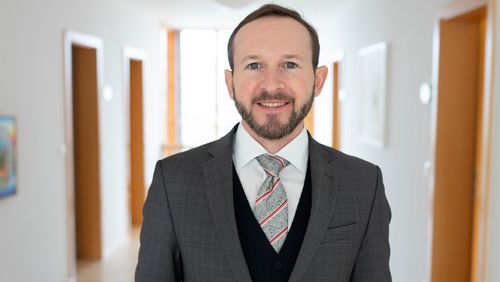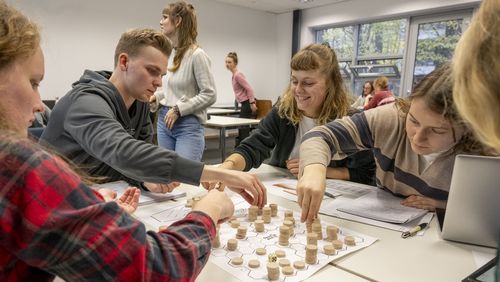The imperatives of ecology and the economy are often seen as contradictory. But for Jörn Hoppmann, Professor of Management at the Department of Business Administration, Economics, and Law, sustainability is a promising business strategy, and the mobility and energy sectors are the focus of his research.
Anyone who grew up in the Wendland region in Lower Saxony in the 1980s spent their childhood among anti-nuclear and green activists, and the country's first organic farmers. Born in 1982 in Gifhorn, a town in the east of Lower Saxony, and today Professor of Management at the University of Oldenburg, Jörn Hoppmann was one of them. And even if his academic discipline might suggest otherwise, the topic of sustainability is the red thread that winds through Hoppmann’s life. His research focuses on sustainable business strategies, organizational change, and technological innovation.
His childhood was shaped by protest. Hoppmann’s parents took part in anti-nuclear demonstrations in the 1990s. His father, a physics and chemistry teacher, and his mother, a biology and physics teacher, were all too aware of the dangers of nuclear waste repositories. Hoppmann’s takeaway from this time: “Protest is an effective way to push for change.” In the meantime, the Wendland has made a name for itself as a model region for ecological agriculture, wind energy, and sustainable tourism – which is why the management scholar believes contemporary movements like Fridays for Future are key to finding solutions for the climate crisis: “From a scientific perspective, we can say that social change gives rise to new laws and regulations, which in turn promote technological and organizational change.“ Hoppmann is someone who thinks across disciplines; who strives to combine business strategies, climate change, and sustainability in a profitable way – and who is bringing big business executives and ecologists to the same table and doing the sums to show them that climate protection and profit do not have to be mutually exclusive. “No big company today can afford not to have a sustainability strategy,” Hoppmann asserts.
Tripartite research
Hoppmann’s research at the University of Oldenburg is tripartite, weaving together innovation, strategy, and sustainability. He also tries to be as sustainable as possible in his private life. As a commuter he spends a lot of time on trains: his wife and one-year-old son live in Hamburg. The 38-year old always tries to keep his CO2 footprint as small as possible without being too preachy about it: “I wouldn’t claim that I do everything perfectly. But I do feel I’m in a position of responsibility, to the students, as much as anyone else,” he stresses. It would go against his principles to not practice in everyday life what he teaches in the lecture hall.
In 2002, when Hoppmann graduated from school with the best grades in his year, the subject of sustainability was not something he focused on initially. After his year of compulsory community service, he studied mechanical engineering and business administration in Braunschweig. He was fascinated by how many disciplines it combined: business management, engineering, physics, maths, but also law and politics. But while many of his peers were already planning a career in the automotive industry, Hoppmann had yet to find his focus. He became more and more interested in innovation issues: How can a company develop innovative products and position them on the market? At that time, sustainability was still very much a niche issue in the executive world.
As a student, he worked on projects that dealt with lean product development at Porsche Consulting in Stuttgart and then landed an internship in Frankfurt at Boston Consulting, one of the largest global strategy consulting firms. At this point Hoppmann reached a decision about his future: as attractive as the lucrative jobs and career opportunities in industry were, he opted for academia instead.
A research trip to the renowned Massachusetts Institute of Technology (MIT) in Cambridge, USA, established the coordinates: Hoppmann completed his Master’s thesis on innovation and lean product development: “I had reached the point where I knew how much I loved academic work and that I wanted to do a PhD. However, I wanted to do it on a subject that seemed meaningful and that would combine my interests in the fields of economics, sustainability, and technology.”
It was after Hoppmann organized the first sustainability summit ever held at MIT that he realized this was what he really wanted to focus on. He then applied to ETH Zurich to do a PhD in the Group for Sustainability and Technology at the university's Department of Management, Technology, and Economics. The problem was that apart from top grades, the young researcher had little to show other than a deep commitment to sustainability. Yet he somehow convinced the selection committee in Switzerland. From then on, sustainability became the main focus of his work, and he decided to specialize in renewable energy. In 2013, Hoppmann earned his doctorate at ETH's Department of Management, Technology and Economics and was awarded the ETH medal for the best doctoral thesis in the department. In his thesis he investigated the drivers and dynamics of innovation for clean energy technologies, with a focus on the photovoltaic industry. While writing his PhD, he went to Harvard University as a Research Fellow in the Energy Technology Innovation Policy group: “My time there left a big impression on me because the Americans had a very different perspective on the energy sector and a quite limited understanding of the German energy transition.”
During his postdoc period in Zurich, Hoppmann looked at how the big electricity suppliers in Switzerland and Germany were reacting to the energy transition: “It was a logical continuation of my PhD research,” he explains. Because by this time, the political situation had shifted and renewables had become far more affordable thanks to government support. Established corporations like electricity suppliers were being forced to change course. They were setting up new departments dedicated to renewables. Hoppmann found it interesting to study how these large companies were discovering sustainability as a strategy and restructuring their organizations accordingly.
Back in northern Germany
Having returned to Germany and to Oldenburg in particular, Hoppmann is now much closer to where he grew up again. “I just love the north!” And he was surprised to see what a powerhouse the Oldenburg “Sustainability Economics and Management” programme is: “A flagship for the university.”
Since his appointment to the Chair of Management, he has extended his empirical focus and his working group now researches both the energy sector and the revolution in the mobility sector. “We decided to look more closely at the mobility sector because – like renewables – it plays a significant role in climate change. The dynamics of the two sectors are astoundingly similar,” the researcher explains. In mobility, too, political impulses are crucial when it comes to getting new technologies onto the market. Established firms are being forced to react strategically to political developments by changing their products and business models. “Right now, for example, we are looking at how established carmakers can prepare large numbers of employees for new areas like electric vehicles, autonomous driving, and car sharing – within a very short time.”
In this context, one topic that is becoming increasingly important and that is helping to drive change is digitalization. Hoppmann and his team have various projects in which they are researching the role of digital platforms in the mobility revolution and the speed at which businesses that rely on digital solutions have to grow in order to remain competitive in the market. Initial findings show that platform businesses face particular challenges in the mobility sector because they need to coordinate numerous interfaces between the physical and virtual world.
The 38-year-old is also researching how industries can reconfigure value chains to create a circular economy. Scientists define this economic model as a system that relies on life-long products, maintenance, and recycling to keep energy and resources consumption as low as possible and minimize waste and emissions. Experts agree that the circular economy could contribute significantly to saving resources and lowering carbon emissions. The EU set ambitious targets for this long ago. “But it’s not yet clear how to achieve them or how individual companies such as packaging manufacturers, recyclers, or retailers will react to this transition,” Hoppmann explains. This is where his team comes in. In one current project Hoppmann is examining factors at the company level that have led to a decline in the use of reusable packaging in the beverage sector, flying in the face of EU targets and leading to an increase in single-use plastics that are more harmful to the environment.
Hoppmann has an excellent reputation with his students: in his first year at the university, he received the 2017/2018 teaching prize in the category “best lecture” for his course “Introduction to Business Administration”. Being close to his students is important to Hoppmann: “On the one hand, it's about giving them a solid basic education, but ideally they will go on to become socially and ecologically responsible citizens, employees, and leaders. This is something that I care deeply about.” For Hoppmann, lectures are an important opportunity to “anchor sustainability-thinking in the minds of the students.”
This article was first published in the current issue of the research magazine EINBLICKE.




